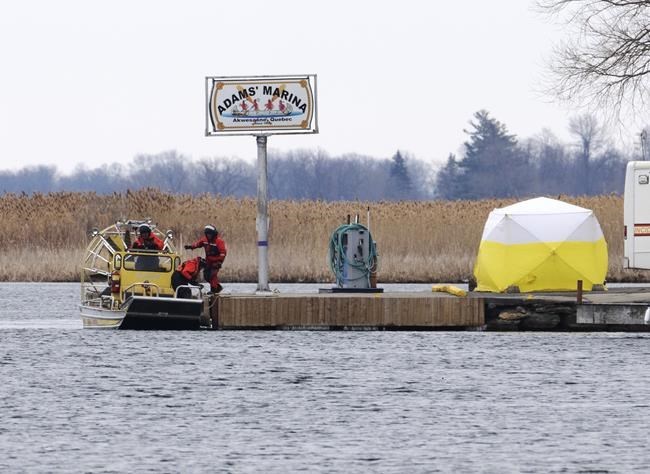QUEBEC — The federal government announced funding to help the Akwesasne Mohawk Territory fight organized crime, after the death of eight migrants in the St. Lawrence River earlier this year.
Public Safety Minister Marco Mendicino was in the community Thursday where he announced more than $12 million for policing and other initiatives over the next five years.
The money includes a $10.4-million funding renewal to help the Akwesasne Mohawk Police Service fight organized crime, as well as separate amounts for new police equipment and for community groups working to prevent violence.
"Akwesasne, like all other communities at the same time, has been confronting the challenges around crime and I would point out that we have seen issues that involve the illegal flow of contraband, obviously organized criminal elements, and most recently, the tragedy involving eight lives lost around an ongoing investigation and human smuggling," he said.
But authorities remained mum on their investigation after the bodies of eight Indian and Romanian migrants were pulled from the St. Lawrence River in late March following what police said was a failed attempt to cross illegally into the United States by boat.
Akwesasne police Chief Shawn Dulude said he couldn't add anything further about the ongoing investigation on Thursday.
"It soundscliché what I'm saying, but I cannot comment because the investigation is ongoing," Dulude said. "Rest assured that what is being done or what needs to be done internationally has been done by our partnering agencies such as the RCMP, and what needs to be done locally or within the region has been done through (Akwesasne Mohawk police) and our neighbouring partner agencies."
The bodies of the two families were pulled from the St. Lawrence River in Akwesasne, about 130 kilometres southwest of Montreal, on March 30 and 31.
Authorities in India have said they are looking for three men in connection with the deaths of the Chaudhari family from Gujarat who died trying to cross the river. According to an Indian police complaint, at least one of the suspects was believed to be in Canada.
Dulude said he was unaware of any arrest warrants issued in Canada.
The other family was the Iordache family from the Toronto area, made up of a couple and their two Canadian-born children.
Authorities have described Akwesasne as a popular spot for human smuggling due its geography, which straddles the borders between Quebec, Ontario and New York state.
Mendicino said Akwesasne's "unique dynamics" require police to focus on border issues and to obtain the collaboration of different law enforcement agencies. He said the funding would allow Akwesasne police to participate in a joint investigative team alongside other agencies, including RCMP, Quebec provincial police, Canada Border Services Agency and U.S. Customs and Border Protection.
"It is the heart of that goal in achieving more collaboration that will facilitate greater information sharing and a unified effort across various levels of law enforcement and border security agencies, which will allow us to invest, investigate, disrupt, and deter organized criminal activity," the minister said.
Dulude said the funding would allow police to purchase technology, such as cameras and drones, that would increase surveillance on the community's roads and waterways.
"The announcement of today won't stop what's going on right now, it's been going on for a long time," Dulude said. "There's always a concern because of where we are — our geography will always be prosperous to that — and we have to keep that in mind when we set out our goals and our strategic planning for the years ahead."
Dulude told reporters in April that police had completed 48 separate interceptions involving 80 people trying to enter the United States illegally since January, but admitted Thursday that his force hadn't arrested any smugglers yet this year.
Since the deaths, Dulude said there's been less activity on the water overall, but said the flow of migrants seen walking between the U.S. and Canada has continued.
Police last month suspended their search on the water for 30-year-old local man Casey Oakes, who was last seen operating the boat that was later found next to the bodies of the two migrant families. Dulude said the search for Oakes is continuing.
This report by The Canadian Press was first published May 25, 2023.
Sidhartha Banerjee, The Canadian Press




